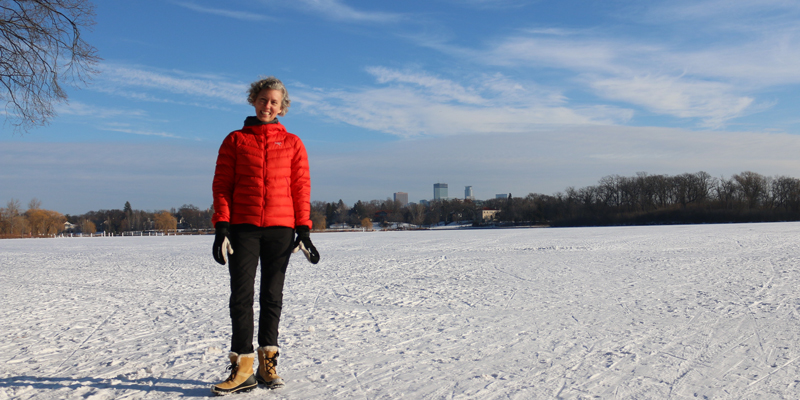Helping sustain and build on Minneapolis parks’ reputation for excellence is all in a day’s work for Jennifer Ringold.

“I realized learning how to structurally engineer a wetland would be interesting, but I was even more interested in diving into the science of how they worked.”
Jennifer Ringold (B.S. Ecology, Evolution and Behavior, ’95) spends a lot of time outside. She has biked the Grand Rounds — 55 miles of connected trails that runs through some of the city’s most scenic spots — more than a dozen times and regularly skis on the Minneapolis Chain of Lakes and Theodore Wirth Regional Parks in the winter. She’s also a regular at playgrounds across the city, the favorite destinations on outings with her nephews.
Ringold is hardly unusual. Minneapolis’ parks are a go-to for many residents and a major point of civic pride. The Trust for Public Land ranked the city’s park system number one for the fifth time in a row in 2017 (St. Paul was a close second). As deputy superintendent of the Minneapolis Park and Recreation Board, its Ringold’s job to manage internal services that support staff who implement the day-to-day operations of the Minneapolis Park and Recreation Board’s vast network of parks, trails, playgrounds, gardens, bird sanctuaries and recreation centers, plus a few less obvious tasks like running ice rinks and maintaining boulevard trees.
It’s hard to imagine a better alignment between work life and personal life than Ringold has achieved given her interests and training, but her path to her current position involved a certain amount of serendipity. As an undergraduate, she planned to go into civil engineering, but fell in love with biology.
“I realized learning how to structural engineer a wetland would be interesting, but I was even more interested in diving into the science of how they worked,” says Ringold.
After changing her major, Ringold landed at the office door of now-retired Ecology, Evolution and Behavior (EEB) Professor Frank Barnwell who taught a popular animal behavior course. Barnwell encouraged her to join the honors program, which meant doing a research project. She joined Barnwell’s lab and worked on a project involving the circadian rhythms of Fiddler crabs.
“I’m fortunate to have had Dr. Barnwell as an advisor. He was energetic and helped me recognize what was possible. He helped me get immersed in the College of Biological Sciences and successfully complete the honors program in a very short window of time,” says Ringold. “It was thrilled one day when he, by chance, walked by my apartment. Now, I see him regularly on walks around the lake.”
She went on to complete a master’s degree that focused on environmental policy and planning at the Humphrey School of Public Affairs with an eye to working in the then-emerging area of sustainability. When a position opened up with Minneapolis Park and Recreation Board, it just made sense as an extension of her interest and expertise in strategic planning, policy, community engagement and sustainability. She’s held various positions within the organization planning division and administration for nearly two decades.
“I have enjoyed every step of my journey, the EEB program was the right thing at the right time and set the a solid foundation,” says Ringold. “My work continues to evolve as the needs the community change. It’s both an honor and humbling to be part of work that improves the quality of life of Minneapolis residents and visitors.”